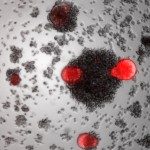Link to Pubmed [PMID] – 30991717
Link to DOI – E186010.3390/ijms20081860
Int J Mol Sci 2019 Apr; 20(8):
The recent emergence and re-emergence of viral infections transmitted by vectors, such as the Zika virus (ZIKV) and Dengue virus (DENV), is a cause for international concern. These highly pathogenic arboviruses represent a serious health burden in tropical and subtropical areas of the world. Despite the high morbidity and mortality associated with these viral infections, antiviral therapies are missing. Medicinal plants have been widely used to treat various infectious diseases since millenaries. Several compounds extracted from plants exhibit potent effects against viruses in vitro, calling for further investigations regarding their efficacy as antiviral drugs. Here, we demonstrate that an extract from Psiloxylon mauritianum, an endemic medicinal plant from Reunion Island, inhibits the infection of ZIKV in vitro without exhibiting cytotoxic effects. The extract was active against different ZIKV African and Asian strains, including an epidemic one. Time-of-drug-addition assays revealed that the P. mauritianum extract interfered with the attachment of the viral particles to the host cells. Importantly, the P. mauritianum extract was also able to prevent the infection of human cells by four dengue virus serotypes. Due to its potency and ability to target ZIKV and DENV particles, P. mauritianum may be of value for identifying and characterizing antiviral compounds to fight medically-important flaviviruses.



